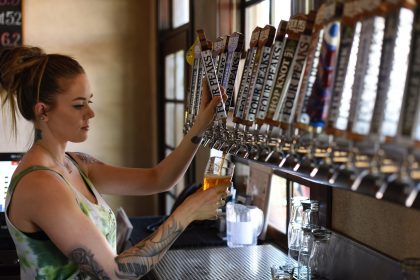
Brewers may finally get a break on a costly tax levied against them since 1791. Bipartisan lawmakers in both the U.S. House and Senate are backing legislation that would permanently reform taxes on brewers, winemakers, distillers and alcohol importers.
The bill – called the Craft Beverage Modernization and Tax Reform Act (CBMTRA) – reduces the federal excise tax on alcoholic beverages. It lowers tax rates for beer, wine and other fermented spirits, like cider. Small brewers save on average $80 million a year without the extra tax.
“Taxes are the single most expensive ingredient in beer, costing more than the labor and raw materials combined,” writes the Beer Institute, a trade organization. “If all the taxes levied on the production, distribution and retailing of beer are added up, they amount to more than 40 percent of the retail price.”
Alcohol excise taxes were the first tax on a domestic product by the U.S. government, and one of the government’s first revenue sources. First collected in 1791, the taxes led to the infamous Whiskey Rebellion tax protest. The purpose of the tax was to help war debt from the Revolutionary War.
Today, though, the government still taxes goods like alcohol and tobacco as part of the “sin tax” logic. Such goods are considered harmful, as alcohol and tobacco consumption is linked to heavy healthcare costs, some paid by taxpayers. Excessive alcohol consumption causes 88,000 deaths a year, an estimated economic impact of $249 billion.
In 2017, the first version of the CBMTRA was passed, under a two-year provision that will expire at the end of 2019. That legislation amended tax law, including:
- For smaller domestic brewers producing fewer than 2 million barrels a year: Reduce federal excise tax from $7 per barrel to $3.50 per barrel for the first 60,000 barrels.
- For all other brewers and beer imports: Reduce federal excise tax from $18 a barrel to $16 a barrel on the first 6 million barrels
- For large brewers with a barrelage over 6 million: Federal excise tax kept at current $18 a barrel.
Brewers, lobbyists and trade associations are pushing for the tax reduction to remain permanent. They point to the huge economic impact the alcohol industry has on the U.S. economy. The U.S. beer industry alone created more than 2.19 million jobs that paid more than $101 billion in wages and benefits in 2018. And, with the increasing popularity of craft brewing, those numbers are rising.
“The craft brewing industry can be found in nearly every Congressional District in the U.S. and contributes more than 500,000 jobs, including an additional 15,000 directly added at small breweries just last year, showcasing the positive momentum supported by temporary provisions,” said Bob Pease, president and CEO of the Brewers Association. “The industry is responsible for contributing more than $76.2 billion to the U.S. economy and is a success story for American industry.”
The wine industry, meanwhile, supported 1.73 million jobs that paid more than $75.7 billion in wages in 2017. Though the cider industry doesn’t have specific numbers on jobs, the cider market grew faster in 2018 than the beer, wine or spirits industry.
“Many of our members are small producers with direct investment in agriculture here in the United States,” said Paul Vander Heide, president of the United States Association of Cider Makers. “This will provide them additional security for their families and capital to invest in growth opportunities for their business.”
After the CBMTRA enactment in 2017, 99 percent of small brewers saw a 50 percent reduction of their federal excise tax. A survey by the Brewers Association found those savings sparked a variety of economic gains for the craft brewing industry:
- 73% of breweries are purchasing new equipment, upgrading their tasting rooms and breweries, moving to new buildings, etc.
- 53% of breweries are hiring new employees
- 39% are increasing their employee benefits by raising pay, offering insurance and expanding vacation time
- 21% are increasing their charitable contributions
- 58% are doing two or more of the above-mentioned actions
Added Bobby Koch, president and CEO of Wine Institute: “The savings will allow wineries across America – most of which are small, family-owned businesses – to hire new employees, upgrade equipment, and invest in the future growth of their wineries.”
Information and updates on the bill can be found on the Congress website. The bill was introduced by Rep. Ron Kind, D-Wisconsin, Mike Kelly, R-Pennsylvania, Sen. Ron Wyden, D-Oregon and Roy Blunt, R-Missouri.
